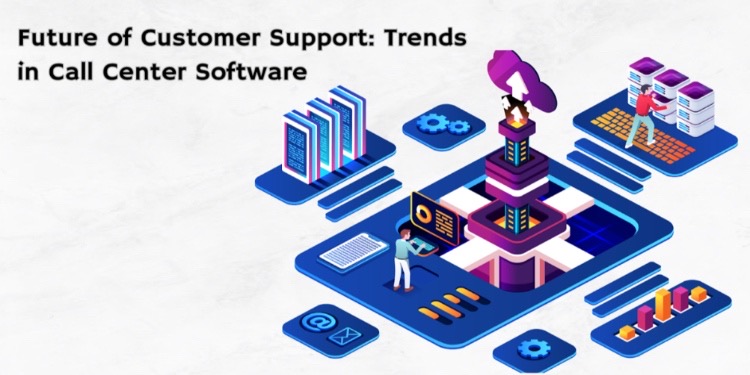In the contact center industry, delivering an outstanding customer experience is non-negotiable. There’s no room for error or exceptions when it comes to providing top-notch service and support.
This line of work is fast-paced and unique, with its own set of specific challenges and demands. As customer expectations rise, businesses increasingly recognize the importance of consistently delivering outstanding support experiences.
That’s why having the right call center software is so crucial for boosting efficiency and productivity. Statistics underscore this point. A recent study by Salesforce found that a whopping 67% of customers say their standards for good customer experiences are higher than ever before. People’s expectations just keep rising year after year.
This blog explores the key trends shaping the future of customer support software and the best practices for meeting evolving customer demands.
The Rise of AI and Automation
The future of customer support is rapidly evolving with the advent of innovative technologies, particularly in the realm of omnichannel software. Omnichannel call center software and customer support platforms are driving this transformation. One of the most significant trends transforming customer support is the increasing adoption of artificial intelligence (AI) and automation.
AI-powered chatbots and virtual assistants are revolutionizing how businesses interact with their customers, offering 24/7 availability, faster response times, and the ability to handle routine inquiries efficiently.
By 2030, the Artificial Intelligence market will grow to a $1345.2 billion industry with solutions like chatbots and intelligent bots leading the charge in customer service.
The integration of conversational AI into customer support software leads to this trend. These AI-powered assistants can understand natural language, interpret customer inquiries, and provide accurate and personalized responses, significantly reducing wait times and improving overall customer satisfaction.
Example: Drift, a leading messaging application for marketing and sales platforms, employs AI-driven chatbots to interact with website visitors in real time. These chatbots handle routine inquiries, qualify leads, and direct more complex questions to human agents as needed.
Improving How Humans Interact with Technology
While AI and automation are transforming customer support, it’s crucial to maintain a balance with genuine human interaction. Technology should enhance, not replace, the human touch in customer service interactions. A study by Accenture revealed that 66% of customers prefer dealing with human paradoxes.
The cloud call center software solutions seamlessly integrate AI and human interactions, leveraging technology to handle routine inquiries and freeing up human agents to focus on more complex and emotionally charged issues. This approach ensures that customers receive personalized, empathetic support when they need it most.
Using Data to Customize Customer Service
In the age of big data, customer support software is increasingly leveraging advanced analytics to offer more personalized and proactive service solutions. By analyzing customer data, including purchase history, preferences, and past interactions, businesses can gain valuable insights into customer needs and behaviors.
This data-driven approach enables companies to anticipate customer requirements, proactively address potential issues, and tailor their support strategies accordingly. According to a Salesforce study, customers expect businesses to recognize and cater to their unique needs and preferences.
Comparison Table: Key Features of Data-Driven Customer Support Software
| Features | Description |
| Predictive Analytics | Analyzes data patterns to anticipate customer needs and issues before they arise. |
| Customer Segmentation | Categorizes customers based on demographics, behavior, and preferences for targeted support strategies. |
| Personalized Recommendations | Suggests relevant products, services, or solutions tailored to individual customer needs. |
| Sentiment Analysis | Monitors customer interactions and feedback to gauge sentiment and identify areas for improvement. |
Making Customer Experience a Top Priority
Historically, customer support was often viewed as a cost center, focused primarily on resolving issues and minimizing operational expenses. However, a significant shift is underway, with leading organizations recognizing customer experience as a strategic priority and a key driver of business growth and customer loyalty.
By 2025, customer experience will overtake price and product as the key brand differentiator. Companies like Amazon and Zappos have built their reputations on delivering exceptional customer experiences, setting the bar for others to follow.
Innovative customer support software solutions are now designed to facilitate seamless, personalized, and memorable interactions that foster long-term customer relationships.
Agile Customer Service: Staying Ready for Surprises
In an ever-changing business landscape, agility is key to adapting to new challenges and customer demands. The pandemic highlighted the importance of agile customer service, as businesses were forced to rapidly adjust their support operations to accommodate remote work and evolving customer needs.
The best customer support software solutions prioritize flexibility and scalability, enabling businesses to adapt to unexpected circumstances quickly. This agility can be achieved through features such as:
- Omnichannel capabilities: Omnichannel software, allows customers to seamlessly transition between various communication channels (e.g., phone, email, chat, social media) without losing context.
- Cloud-based architecture: Enabling remote access and easy scalability to handle fluctuating demand.
- Modular design: Facilitating the integration of new technologies and features as required.
By embracing agile customer service practices and investing in adaptable software solutions, businesses can remain resilient and responsive to changing market conditions and customer expectations.
Upcoming Technology and Innovations
As technology continues to evolve, the future of customer support software will be shaped by cutting-edge innovations. Some of the emerging technologies likely to impact the industry include:
- Advanced AI and Natural Language Processing (NLP): More sophisticated AI systems will enable more natural and contextual conversations, improving the customer experience.
- Predictive Analytics and Machine Learning: Utilizing advanced algorithms to analyze vast amounts of data and provide more accurate predictions and personalized recommendations.
- Augmented Reality (AR) and Virtual Reality (VR): Enhancing remote support capabilities by enabling visual guidance and immersive training experiences.
- Internet of Things (IoT) Integration: Connecting customer support software with IoT devices to enable proactive monitoring, remote diagnostics, and predictive maintenance.
As these technologies mature and become more accessible, customer support software will continue to evolve, offering more intelligent, personalized, and seamless experiences for both customers and support agents.
Future of Customer Support: Trends in Call Center Software
In the contact center industry, delivering an outstanding customer experience is non-negotiable. There’s no room for error or exceptions when it comes to providing top-notch service and support.
The future of customer support is being shaped by rapid technological advancements, shifting customer expectations, and the recognition of customer experience as a strategic imperative. The best customer support software solutions will leverage AI and automation to enhance efficiency while maintaining genuine human interactions in complex and emotionally charged situations.
Data-driven insights will enable personalized and proactive support, while agile and adaptable solutions will ensure businesses can navigate changing market conditions and customer demands. As emerging technologies continue to mature, customer support will become even more intelligent, immersive, and seamless, driving customer satisfaction and loyalty to new heights.
To stay ahead of the curve, businesses must continuously innovate and adapt their customer support strategies, embracing the latest trends and technologies shaping the industry. By doing so, they can deliver exceptional customer experiences that drive long-term success and differentiate themselves in an increasingly competitive market.
Frequently Asked Questions
1. Are chatbots replacing human agents entirely?
Not entirely. Chatbots handle routine queries and repetitive tasks, but human agents remain crucial for addressing complex issues, providing empathy, and delivering personalized interactions. The synergy between AI and human expertise is the winning formula.
2. How can businesses ensure data privacy when using chatbots?
Businesses must prioritize data security. Chatbots should comply with privacy regulations, anonymize sensitive information, and have robust encryption protocols. Transparency with customers about data usage is essential.
3. What’s the role of emotional intelligence in AI-driven customer support?
Emotional intelligence matters! AI can analyze sentiment, but true empathy comes from human agents. Combining AI efficiency with human warmth creates exceptional customer experiences.
4. What Is the Role of Omnichannel Support in Modern Call Centers?
Omnichannel support has become the gold standard for customer service. Customers expect seamless interactions across various channels from browsing a website to messaging on social media or emailing. Call centers must integrate these channels to provide consistent and efficient experiences.


![7 Best POS Software in the UK [2026 Edition]](https://todaynews.co.uk/wp-content/uploads/2026/02/7-Best-POS-Software-in-the-UK-2026-Edition-360x180.png)





















































![7 Best POS Software in the UK [2026 Edition]](https://todaynews.co.uk/wp-content/uploads/2026/02/7-Best-POS-Software-in-the-UK-2026-Edition-120x86.png)

![7 Best POS Software in the UK [2026 Edition]](https://todaynews.co.uk/wp-content/uploads/2026/02/7-Best-POS-Software-in-the-UK-2026-Edition-350x250.png)


















